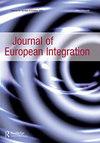The construction of the EU as a strategic entrepreneur:the internal-external-internal nexus
IF 3.1
1区 社会学
Q1 INTERNATIONAL RELATIONS
引用次数: 1
Abstract
ABSTRACT The paper investigates how the EU operates as a strategic entrepreneur in different contexts and what enables the EU to do so. We develop a synthetic and dynamic approach linking the EU’s internal characteristics with its internal and external strategies and actions, which we envision as an internal-external-internal cycle that advances European integration. First, we discuss the EU’s distinctive internal governance characteristics. Second, we demonstrate how these characteristics condition and support the EU as a strategic entrepreneur in external affairs. Third, we investigate how external perceptions and legitimacy can feedback to reinforce the EU’s (re) construction of its own internal strategies. External legitimacy pushes the EU to ascertain appropriate and accepted behaviour and strengthen institutional and policy integration, expanding the EU’s competences over more policy areas.欧盟作为战略企业家的构建:内部-外部-内部关系
本文探讨了欧盟在不同背景下作为战略企业家是如何运作的,以及是什么使欧盟能够这样做。我们开发了一种综合的动态方法,将欧盟的内部特征与其内部和外部战略和行动联系起来,我们将其设想为推进欧洲一体化的内部-外部-内部循环。首先,我们讨论了欧盟独特的内部治理特征。其次,我们论证了这些特征如何条件和支持欧盟在对外事务中作为一个战略企业家。第三,我们研究了外部认知和合法性如何反馈,以加强欧盟自身内部战略的(重新)构建。外部合法性促使欧盟确定适当和可接受的行为,加强制度和政策整合,扩大欧盟在更多政策领域的能力。
本文章由计算机程序翻译,如有差异,请以英文原文为准。
求助全文
约1分钟内获得全文
求助全文

 求助内容:
求助内容: 应助结果提醒方式:
应助结果提醒方式:


